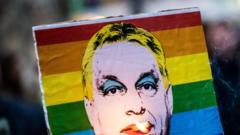Despite threats from Prime Minister Viktor Orban regarding possible legal consequences, organizers of Budapest Pride are determined to proceed with Saturday's planned event, expecting a surge in attendance.
Hungary Pride Set to Proceed Amidst Orban's Warnings of Legal Action

Hungary Pride Set to Proceed Amidst Orban's Warnings of Legal Action
LGBTQ rights activists gear up for Budapest Pride march as political tensions rise.
Hungary is on the brink of a significant showdown as its annual Pride march is set to take place this Saturday, defying legal threats issued by Prime Minister Viktor Orban against LGBTQ rights activists. The event's organizers maintain high hopes for record participation, even as they face mounting pressure from nationalist conservative politicians and law enforcement aimed at curtailing any pro-LGBTQ demonstrations.
In anticipation of the march, police have imposed restrictions pursuant to a newly enacted "child protection" law designed to limit events perceived as promoting homosexuality. The day prior to the Pride festivities, Orban attempted to downplay the potential for violent confrontations between police and march participants, yet underscored that attendees could face significant legal repercussions.
"While the police have the authority to disband such gatherings, we are a civilized nation and do not resort to violence," Orban stated during a Friday interview with state radio. However, he warned of potential legal consequences, emphasizing the severity of enforcement without escalating to physical confrontation.
Participants in the march could be subjected to fines of up to €500 ($586), and authorities are equipped with facial recognition technology to identify them. The organizers themselves may incur penalties, including a possible one-year prison sentence for those leading the event.
EU Equalities Commissioner Hadja Lahbib, who has recently visited Budapest, is expected to join the march alongside numerous Members of the European Parliament. Lahbib expressed her solidarity through social media, sharing a photo with the liberal mayor of Budapest, Gergely Karacsony, in front of a rainbow flag—a potent symbol of LGBTQ rights. "The Pride march will serve as a powerful emblem of civil society's resilience," she conveyed on X.
As the march approaches, European Commission President Ursula von der Leyen has appealed to the Orban government to allow the event to proceed unimpeded. However, Orban remained unyielding, urging her to refrain from meddling in the legislative matters of EU member states. The unfolding events in Hungary signal a critical moment for LGBTQ rights and civil liberties, as activists prepare to assert their presence despite formidable opposition.
In anticipation of the march, police have imposed restrictions pursuant to a newly enacted "child protection" law designed to limit events perceived as promoting homosexuality. The day prior to the Pride festivities, Orban attempted to downplay the potential for violent confrontations between police and march participants, yet underscored that attendees could face significant legal repercussions.
"While the police have the authority to disband such gatherings, we are a civilized nation and do not resort to violence," Orban stated during a Friday interview with state radio. However, he warned of potential legal consequences, emphasizing the severity of enforcement without escalating to physical confrontation.
Participants in the march could be subjected to fines of up to €500 ($586), and authorities are equipped with facial recognition technology to identify them. The organizers themselves may incur penalties, including a possible one-year prison sentence for those leading the event.
EU Equalities Commissioner Hadja Lahbib, who has recently visited Budapest, is expected to join the march alongside numerous Members of the European Parliament. Lahbib expressed her solidarity through social media, sharing a photo with the liberal mayor of Budapest, Gergely Karacsony, in front of a rainbow flag—a potent symbol of LGBTQ rights. "The Pride march will serve as a powerful emblem of civil society's resilience," she conveyed on X.
As the march approaches, European Commission President Ursula von der Leyen has appealed to the Orban government to allow the event to proceed unimpeded. However, Orban remained unyielding, urging her to refrain from meddling in the legislative matters of EU member states. The unfolding events in Hungary signal a critical moment for LGBTQ rights and civil liberties, as activists prepare to assert their presence despite formidable opposition.





















